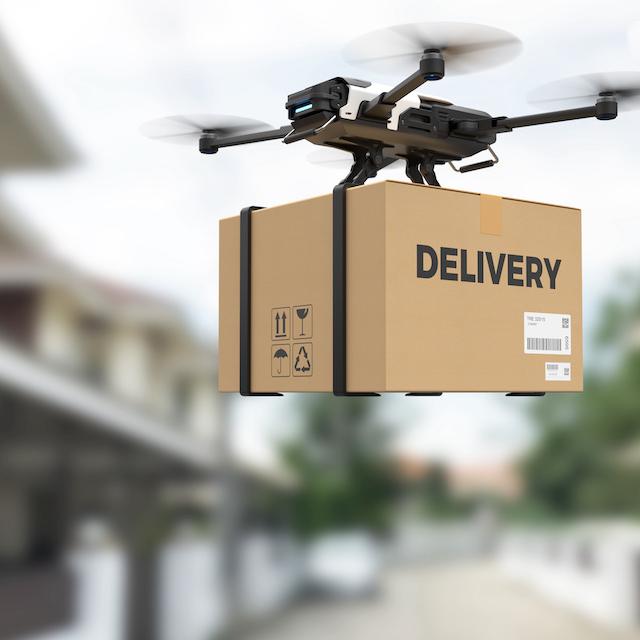
Fort Worth is First Major US City to Permit Drone Deliveries: TCU Faculty Weigh In
The city of Fort Worth recently announced that it would be the first major metropolitan city in the country to offer commercial drone deliveries. Walmart is the first to participate, offering delivery from select stores. The development brings together many elements, from privacy and business innovation to environmental and urban impact. Several TCU faculty offered their input on the various aspects.
 URBAN IMPACT
URBAN IMPACT
Sean Crotty, associate professor of geography
As the first major city to allow commercial drone delivery, Fort Worth and its elected
officials will be paving the way. How do you see this playing out?
Some of the technology used for drone delivery is being developed in the AllianceTexas
Mobility Innovation Zone in north Fort Worth. Demonstrating that our community is
open to being a real-world testing ground for these sorts of technologies should help
to attract more businesses to the region, so this is a smart choice from an economic
development standpoint. Being technology-forward and focused is a clear priority of
Mayor Mattie Parker’s administration, and I think this fits into that framework as
well. In terms of zoning, there’s no land-use zoning that applies to aerial drones,
so the city will be making it up as they go. This is always the case with new technologies;
we didn’t have regulations about the legally acceptable times to use gas mowers or
leaf-blowers until enough folks were waking their neighbors up with them that the
city was forced to get involved. This will probably work similarly. There may be some
regulations at the outset, like they can’t fly near hospitals or other places where
helicopters make a lot of unscheduled take-offs and landings, or they can’t fly over
schools during class hours, etc. Over time, the regulations will become more nuanced
as the general public weighs in on what they like or don’t like about them.
 PRIVACY AND SECURITY CONCERNS
PRIVACY AND SECURITY CONCERNS
Bo Mei, associate professor of computer science
According to the city of Fort Worth, the drones will operate securely and respect
residents’ privacy. Can a program like this be successfully implemented and maintain
privacy?
Yes, but it requires careful planning and stringent regulations. The
use of low-resolution cameras that are solely for navigation purposes and not for
capturing live feeds or photographs is a significant step toward ensuring privacy.
Additionally, the deployment of drones in a controlled and regulated manner, with
oversight from agencies like the FAA, helps to address privacy concerns. However,
the success of maintaining privacy also depends on how transparent the program is
with the public and how responsive it is to any concerns that arise. Public trust
can be built through clear communication about how data is collected, stored and used.
Regular audits and third-party assessments can also help ensure that privacy standards
are being met.

Weiwei Liu, associate professor of economics
The city of Fort Worth stated that drones use less energy than typical household appliances.
What do you see as the potential environmental impact and economic impact of drone
deliveries in a metropolitan city?
One of the potential benefits of drone deliveries is to reduce CO2 emissions that
contribute to climate change. The drones used by Walmart from Wing and Zipline are
purportedly all electric and have zero carbon emissions. With drones replacing some
of the traditional diesel or gas delivery vans, retail delivery services in the area
will likely see lower carbon footprints. Note that emissions from drone batteries
and electricity generation are not taken into consideration here. If widespread use
is eventually adopted, drone deliveries will potentially reduce traffic congestion,
save time on commuting and lower the probability of traffic accidents.
 THE BUSINESS ASPECT
THE BUSINESS ASPECT
Travis Tokar, professor of supply chain management
What motivates a major retailer such as Walmart to engage in drone deliveries? How
might drone deliveries impact the supply chain, consumer behavior, etc.?
Retailers competing online are in a fierce battle of one-upmanship regarding last-mile
delivery services, with lead times growing ever shorter to attract and retain customers.
This is sometimes referred to as the “Amazon Effect,” as the company has driven much
of the change in shoppers’ delivery expectations over the years. The availability
of drone delivery could usher in some lifestyle changes for people who need a last-minute
birthday gift or cooking ingredient. However, I don’t foresee drones impacting the
supply and demand of goods at the macro level. This is in part due to current limits
on delivery (weight, size, etc.) and the relatively high delivery fees. Stores and
distribution centers will need to include space for drone operations, which might
require some adjustments. However, my understanding is that a large footprint is not
required.
 INFLUENCE ON HEALTH
INFLUENCE ON HEALTH
Don Thushara Galbadage, associate professor of applied health science
If drone delivery becomes more and more widespread, what is the potential impact on
community health? Similarly, what could be the concerns for privacy and safety?
Drone delivery of medications supports the essential public health service of promoting
equitable access to care, particularly for underserved and vulnerable populations.
These groups include the elderly, people with disabilities, those living in rural
or remote areas, low-income individuals and patients with debilitating acute or chronic
illnesses, all of whom face barriers such as lack of transportation or mobility issues
that delay access to timely health care. By delivering medications directly to homes,
this technology helps reduce those barriers and enhance health equity. It can also
provide timely access to life-saving medications in emergencies and complements telemedicine
by enabling patients to receive both virtual care and physical treatments without
leaving their homes.
However, concerns remain about the safety and security of sensitive pharmaceuticals, such as controlled substances, during transport. Additionally, privacy risks may arise if personal health data associated with deliveries are compromised. There is also the potential for health care inequities to widen if rural or underserved communities have limited access to drone services. Despite these challenges, with careful regulation and equitable deployment, drone delivery has the potential to improve access to care and improve population health.
 COMMUNITY IMPACT
COMMUNITY IMPACT
Debi Iba, senior instructor of communication studies
How might the use of drones impact communities and the ability of drone delivery to
serve quickly, especially in areas where food access or transportation might be limited?
Drone deliveries certainly have the potential to positively impact our Fort Worth
communities. Everyone eats. But not everyone has easy and safe access to food and
necessary goods. Think of families with infants and young children, people with fragile
health, or those with constraints on mobility and transportation. While anyone might
benefit from a reliable and convenient mechanism for delivery, for more vulnerable
populations, drone delivery could be the difference between having a meal or going
hungry, getting medicine and first-aid supplies when urgent, or not. Drones will literally
change the way we use our community spaces and places. Ultimately, drone deliveries
offer all of us the opportunity to be included in a larger community of support. And
that is a very good thing.
